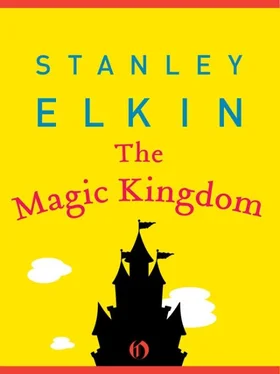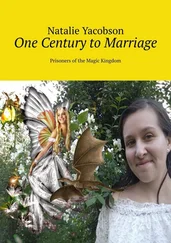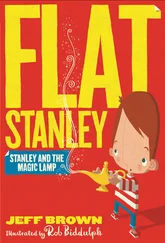“Why?”
“Ask me another,” he said.
“Why?”
“They’ve got to find out how many beans make five, don’t they? It’s only your ordinary level pegging, merely keeping abreast. There’s a ton of niff in this world, you know. There’s just lashings and lashings of death. Hark!” He broke off. “ Watch what you think you’re going to miss. Hush! Squint!” The man with the mustache and sideburns was passing in front of them.
And now you couldn’t have dragged them away. You couldn’t have rolled Janet Order’s or Mudd-Gaddis’s wheelchair downhill.
“Uh-oh,” Colin Bible said, “we’ve been sold a pup.”
“Snookered!” said one of the children.
“Skinned!” said another.
“Socked!”
“Some mothers have ’em,” Benny Maxine said.
Because they saw that Colin had been wrong.
The man was not young, after all. He could have been in his fifties. He wore cowboy boots, the cheap imitation leather not so much worn as peeling, chipped as paint and mealy and rotten as spoiled fruit. His high raised heels were of a cloudy translucent plastic. Flecks of gold-colored foil were embedded in them like sparks painted on a loud tie. Up close he had the queer, pale, lone, and fragile look of men who cut themselves shaving. Of short-order cooks, of men wakened in drunk tanks or beaten in fights. A bolo tie, like undone laces, hung about a bright pink rayon shirt that fit over a discrete paunch tight and heavy as muscle. A chain that ran through a wallet in the back pocket of his pants was attached to his belt.
Nor were his broad sideburns dyed. They were tattooed along his ears and down his cheeks. His mustache was tattooed. The actual gloss and sheen tattooed too — like highlights in a landscape. Everything only indelible, deep driven inks among the raised scars of his illustrated whiskers.
They were gathering, coming together quickly now, lining up along the curbs, building a crowd, rapidly taking up the best vantage points like people filling a theater. “See ’em? They look like fans at the all-in wrestling,” Colin said wickedly. And they did. Something not so much supportive as impatient and partisan about them. Apple Annies of style, Typhoid Marys of spirit, the men as well as the women, they could have been carriers, not of disease but of vague, pandemic strains on the psyche, on tastes not depleted but somehow made accommodate to the surrender terms of their lives and conditions. As though they’d survived their dreams, even their lives, only to find a need to be at a parade of cartoon characters at Disney World.
It was different with the children, their parents. Oddly in the minority, Colin barely made mention of them, as though most lives came with a grace period, thirty or thirty-five years, say, some fifty-thousand-mile guarantee of the agreeable and routine. It was the widows traveling together he pointed out, the senior citizens up from Miami or down from such places as Detroit or Cleveland on package tours. It was the retirees, the couples unescorted by kids. They were casually dressed, the women in pants suits or sometimes in shorts — it was a mild fall day — the men in Bermudas, in slacks the color of artificial fruit flavors, in white shoes, in billed caps with fishermen’s patches. (Cinderella Castle, towering above them in the background, made them seem more like subjects than ever, reasonably content, well- off, even, but with a whiff of the indentured about them, of an obligated loyalty.)
“Look there!” Colin Bible said. “And there. Look at those over there!”
There was a couple with the lined, bloated, and satisfied heads of midgets. Wens were sprinkled across their faces like a kind of loose change of flesh.
There was a potbellied, slack-breasted man, his wife with bad skin, wrinkled, scarred, pitted as scrotum. They had smooth, fat fingers, and their hands were balled into the ineffectual, hairless fists of babies.
“Look, look there, how ugly!” Colin said.
An angry woman with long dark hair, her back to the street, stood near the couple with the wens. Her hair, tied beneath her chin, looked like a babushka. She stared back at Colin and the children, her black, thick eyebrows exactly the color and shape of leeches above eyes set so deep in her skull they seemed separated from her face, hidden as eyes behind a mask or holes cut from portraits in horror films. A set of tiny lips, Kewpie- doll, bow-shaped, red and glossy as wet paint, and superimposed, grafted onto her real lips like a botched bookkeeping or clumsy work in a child’s coloring book, tinted an additional ferocity into her scrutiny.
“It breaks your heart,” Colin said. “Imperfection everywhere, everywhere. Not like in nature. What, you think stars show their age? Oceans, the sky? No fear! Only in man, only in woman. Trees never look a day older. The mountains are better off for each million years. Everywhere, everywhere. Bodies mismanaged, malfeasanced, gone off. Like styles, like fashions gone off. It’s this piecemeal surrender to time, kids. You can’t hold on to your baby teeth. Scissors cut paper, paper covers rock, rock smashes scissors. A bite of candy causes tooth decay, and jawlines that were once firm slip off like shoreline lost to the sea. Noses balloon, amok as a cancer. Bellies swell up and muscles go down. Hips and thighs widen like jodhpurs. My God, children, we look like we’re dressed for the horseback! (And everywhere, everywhere, there’s this clumsy imbalance. You see these old, sluggish bodies on thin-looking legs, like folk carrying packages piled too high. Or like birds puffed out, skewed, out of sorts with their foundations.) And hair. Hair thins, recedes, is gone. Bodies fall away from true. I don’t know. It’s as if we’ve been nickel-and-dimed by the elements: by erosion, by wind and water, by the pull of gravity and the oxidation of the very air. Look! Look there!”
A middle-aged woman in a print dress waited in house slippers for the parade to begin. She was crying. Tears pushed over the ledges of her eyes. A clear mucus filled a corner of one nostril.
A dowager’s hump draped a pretty young woman’s shoulders and back like a shawl.
They saw the details of a man’s face, the stubble, lines, cleft, dimples, and pores, sharp and clarified as closeups in black-and- white photographs.
Sunglasses in the form of swans, masks, butterflies, or random as the forms of costume jewelry. Odd-shaped wigs and hairdos sat on people’s heads like a queer gardening, a strange botany. And, everywhere, penciled eyebrows, painted lips, like so many prostheses of the cosmetic.
It had begun now, the parade. A well-dressed man in a business suit stood at attention as the floats passed by. He held his hat over his heart. (And sanity, sanity too, marred, scuffed as a shoe, wrinkled as laundry.) It had begun now, but the children weren’t watching. They couldn’t take their eyes off the crowd. (“ This, this is the parade!”) They stared at the special area the park had provided for guests in wheelchairs, at the old men and women who sat in them, bundled against some internal chill on even this warm day, wrapped in blankets that tucked over their feet, in sweaters, in scarves, in wool gloves and mittens, covered by hats, by caps, Mickey Mouse’s eared beanies, dark as yarmulkes, on top of their other headgear; at, among them, an ancient woman in a rubber Frankenstein mask for warmth; at her nurse, feeding her cigarettes, venting her smoke through a gap in the monster’s wired jaws. At other women, depleted, tired, who sat on benches, their dresses hiked well above their knees, their legs (in heavy stockings the color of miscegenetic, coffee-creamed flesh) not so much spread as forgotten, separated, guided by the collapsing, melted lines of their thighs. At their husbands (or maybe just the men they lived with, for convenience, for company, for making the welfare checks go farther), their hands in their laps, incurious as people who have just folded in poker. (And everywhere those dark glasses. “It ain’t for the glare,” Colin told them, “it’s for the warmth!”) At grown men and women wearing the souvenirs of the Magic Kingdom: sweat shirts, T-shirts, with Eeyore, with Mickey Mouse, with Jiminy Cricket, Alice-in-Wonderland pinafores, Minnie Mouse dresses, carryalls with Dumbo and Tigger and Tramp. At a woman in her sixties, inexplicably wearing a boa, a turban, a veil of wide, loose black mesh; at hands and arms and shoulders blotched by liver spots; at a man in baggy pants suspiciously, unscrupulously bulging. At a man in shorts, the enlarged veins on his legs like wax dripping down Chianti bottles in Italian restaurants.
Читать дальше












